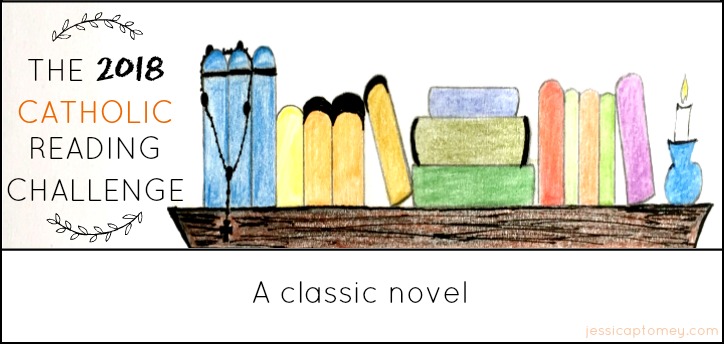Don’t worry if you got a little behind in your picks for the 2018 Catholic Reading Challenge? I did for a little bit, and I’m getting caught up on sharing my picks with you. This one was a favorite!

Category: “A classic novel”
My Pick: The Idiot by Fyodor Dostoevsky
I’m sad to say that I didn’t start reading the great Russian authors until a couple of years ago…but that’s okay; I can spend the rest of my adult years marinating in them. I’m not able to say anything profound about Dostoevsky; but there are plenty of literary critics and brilliant minds who have us covered there. (In fact, I was down that rabbit hole of commentary research right after finishing this book. Now my TBR is filled up with Romano Guardini & Henri de Lubac — both of whom I came upon references to recently in Flannery O’Conner’s letters, as providence would have it.) However, I will share some novice delights and observations.
Russian names! Am I right?
One disadvantage to listening to the audiobook is that I think it makes it a little bit harder to follow who is who. For those who haven’t read Dostoevsky, we aren’t dealing with names like “Michael” and “Samantha.” They’re a bit longer. But that isn’t the confusing part. They have nick-names. But they aren’t “Mike” and “Sam.” They are NOTHING like the full name. So you are going to want to have a cheat sheet handy, which many volumes provide in the front of the edition. Again, I didn’t have that to flip to with the audio. So…I did a quick web search a few chapters in to get back on track and make sure I was following the character development correctly. Be careful if you do that! Though the character synopsis straightened up the names and nick-names for me, it also included BIG spoilers. 🙁
Once I got the names straight, I started getting obsessed with saying them. Russian names a have beautiful way of rolling off the tongue. Female characters Anastassya Filippovna and Aglaya Ivanovna Yepanchin are just a couple of examples. My husband and I have certainly been complete Anglophiles in naming our kids, but I have to say that I was tempted toward a whole new direction of baby names. 😉
Character and Plot Complexity…
One reason that I think I have a fondness for Dostoevsky is that his writing is dialogue heavy — also the case with Jane Austen’s work and the basis of my love of it. There is such an economy with Dostoevsky’s words in rapidly developing multiple characters and plot lines. Within half of one chapter you are literally immersed in the characters’ lives and caring about their stories, their plights, and what is to become of them. And it’s not a simple story line; it gets complex fast! But the story remains completely accessible. It’s just that you find yourself wondering how, in such a short time, he has transported you into this world. He is the master at this. I know of no author that can accomplish it…at least no author with comparable genre and style. To get your character to reveal such detail through dialogue in a very few pages is simply masterful.
Characters That Create Empathy…
One final thought…every character could be you or me. Dostoevsky’s work has been described as “polyphonic” or “multi-vocal,” meaning that there is a continual dialogue threaded throughout the character development. It’s hard to pinpoint characters as binary — villains or heroes. They are all realistically flawed, and they allow us to see a bit of ourselves in each one. Why is this significant? I think it creates empathy in the reader. We cannot so easily dehumanize others if we see a bit of ourselves in them. Dostoevsky’s characters — just like the individuals we encounter in our lives — are both battling ills and striving toward some good. Some fail. Some succeed. All are worthy of our compassion and care.
What did you read for “a classic novel”?

Copyright 2018 Jessica Ptomey
